This special EuroIntervention supplement is, in large part, related to the first resistant hypertension course (RHC) which took place in Berlin last February. This will come as no surprise when you see that the two directors of that course, Sverre Kjeldsen and Felix Mahfoud, have also agreed to be the guest editors together with Joost Daemen of this special edition of our journal. The course was a great success, unique in its ability to bring together players from all the different domains dealing with resistant hypertension: a joint initiative which included the European Society of Hypertension (ESH), EAPCI, the ESC’s Hypertension and the Heart working group, the Italian and German societies of hypertension as well as PCR. In many ways, this supplement grew out of the working relationships that we forged together during this meeting.
The treatment of resistant hypertension is a new domain of competence for the interventional cardiologist, and the mission of the EAPCI is to ensure that our members are well informed with access to the latest information and data, both clinical and research, in this emerging field. We need to enlarge and deepen our understanding of the fundamental concepts in the treatment of hypertension as a whole –and resistant hypertension specifically– while exploring in an open and critical way these new avenues for its successful treatment using catheter-based methods. Today we are at the beginning of such interventional approaches, and we must proceed with care, basing our advances on true science and clinical experience. We need to build upon our knowledge with a collaborative spirit, sharing and learning from each other as we approach a unique group of treatments which offer great promise for the treatment of resistant hypertension, a domain which, until recently, was not within the scope of our speciality.
A long-term commitment
To promote and inform about a new treatment modality is not something that can occur overnight. For the EAPCI, educating our members on hypertension and the treatment of resistant hypertension is part of a long-term commitment on the part of our association to provide the best possible information on techniques and practice. Last year at EuroPCR 2012 resistant hypertension was featured in the Great Debate (which was also repeated at last year’s ESC meeting), and this year resistant hypertension will be one of the key tracks –a central topic– at EuroPCR 2013. Last year, the EAPCI-PCR textbook included a dedicated and outstanding chapter written by Thomas Lüscher concerning the evolving concept of treating resistant hypertension through techniques such as renal denervation. We, of course, participated in the Berlin Resistant Hypertension Course, as well as its interactive website; this supplement then is a natural next step in the development of our communication and educational tools concerning this critical disease.
One of the missions of the EAPCI is to promote information and education for interventional cardiology. Our association needs to ensure a non-biased objective analysis of new developments, techniques and devices in our field along with open discussions concerning their different advantages, contraindications and future possibilities, similar to what we accomplished with the successful introduction of transcatheter valves several years ago. This is true today for the treatment of resistant hypertension, where the new developments you will read about in this supplement present great promise. We need to approach them from both a theoretical as well as a practical standpoint; beginning by understanding what hypertension is and, after, moving towards defining resistant hypertension itself and what it would mean to treat this condition using the sympathetic nervous system. With the theoretical as our foundation, we can then approach the practical, discussing the new catheter-based renal sympathetic denervation treatment modalities. We can learn about the currently available CE mark systems and share our experience of the new techniques involved: How do they work? Are they effective? Are they safe? We need to present and discuss cases from the preliminary research to the first-in-man results that we have available today.
This is part of the mission of the EAPCI, a commitment to promoting the practice of interventional medicine with the highest degree of interaction, bringing specialists from outside our domain to share their experiences with us honestly confront the facts and, together, to advance our practice of medicine.
For the new modalities in valve treatments our association officially sponsors PCR London Valves, an annual gathering dedicated to the open exchange of information and practice on this important aspect of our work, and now the EAPCI is also pleased to include the Resistant Hypertension Course as one of the official meetings of our association.
The goal of the EAPCI is not only to provide information, but to stimulate our community to exchange knowledge, to progress in our research and in our work, and to continue to offer the cutting edge in technology and experience whether in the more “traditional” interventional fields, or in the treatment of hypertension in general, and resistant hypertension specifically. This supplement is part of this ongoing educational process and an exciting step in a new direction of patient care.

